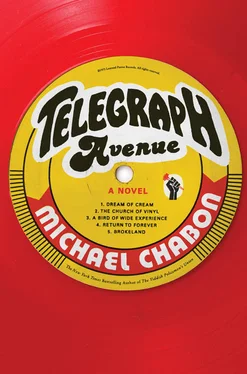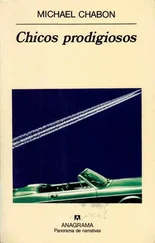Michael Chabon
TELEGRAPH AVENUE
A Novel
To Ayelet, from the drop of the needle to the innermost groove
Call me Ishmael.
—Ishmael Reed, probably.
Awhite boy rode flatfoot on a skateboard, towed along, hand to shoulder, by a black boy pedaling a brakeless fixed-gear bike. Dark August morning, deep in the Flatlands. Hiss of tires. Granular unraveling of skateboard wheels against asphalt. Summertime Berkeley giving off her old-lady smell, nine different styles of jasmine and a squirt of he-cat.
The black boy raised up, let go of the handlebars. The white boy uncoupled the cars of their little train. Crossing his arms, the black boy gripped his T-shirt at the hem and scissored it over his head. He lingered inside the shirt, in no kind of hurry, as they rolled toward the next pool of ebbing streetlight. In a moment, maybe, the black boy would tug the T-shirt the rest of the way off and fly it like a banner from his back pocket. The white boy would kick, push, and reach out, feeling for the spark of bare brown skin against his palm. But for now the kid on the skateboard just coasted along behind the blind daredevil, drafting.
Moonfaced, mountainous, moderately stoned, Archy Stallings manned the front counter of Brokeland Records, holding a random baby, wearing a tan corduroy suit over a pumpkin-bright turtleneck that reinforced his noted yet not disadvantageous resemblance to Gamera, the giant mutant flying tortoise of Japanese cinema. He had the kid tucked up under his left arm as, with his free right hand, he worked through the eighth of fifteen crates from the Benezra estate, the records in crate number 8 favoring, like Archy, the belly meat of jazz, salty and well marbled with funk. Electric Byrd (Blue Note, 1970). Johnny Hammond. Melvin Sparks’s first two solo albums. Charles Kynard, Wa-Tu-Wa-Zui (Prestige, 1971). As he inventoried the lot, Archy listened, at times screwing up his eyes, to the dead man’s minty quadrophonic pressing of Airto’s Fingers (CTI, 1972) played through the store’s trusty Quadaptor, a sweet gizmo that had been hand-dived from a Dumpster by Nat Jaffe and refurbished by Archy, a former army helicopter electrician holding 37.5 percent—last time he’d bothered to check—of a bachelor’s in electrical engineering from SF State.
The science of cataloging one-handed: Pluck a record from the crate, tease the paper sleeve out of the jacket. Sneak your fingers into the sleeve. Waiter the platter out with your fingertips touching nothing but label. Angle the disc to the morning light pouring through the plate window. That all-revealing, even-toned East Bay light, keen and forgiving, always ready to tell you the truth about a record’s condition. (Though Nat Jaffe claimed it was not the light but the window, a big solid plate of Pittsburgh glass vaccinated against all forms of bullshit during the period of sixty-odd years when the space currently housing Brokeland Records had been known as Spencer’s Barbershop.)
Archy swayed, eyes closed, grooving on the heft of the baby, on the smell of grease coming off of Ringo Thielmann’s bass line, on the memory of the upraised eyes of Elsabet Getachew as she gave him head yesterday in the private dining room of the Queen of Sheba Ethiopian restaurant. Recollecting the catenary arch of her upper lip, the tip of her tongue going addis ababa along the E string of his dick. Swaying, grooving, feeling on that Saturday morning, just before the boots of the neighborhood tracked bad news through his front door, like he could carry on that way all day, forever.
“Poor Bob Benezra,” Archy said to the random baby. “I did not know him, but I feel sorry for him, leaving all these beautiful records. That’s how come I have to be an atheist, right there, Rolando, seeing all this fine vinyl the poor man had to leave behind.” The baby not too young to start knowing the ledge, the cold truth, the life-and-death facts of it all. “What kind of heaven is that, you can’t have your records?”
The baby, understanding perhaps that it was purely rhetorical, made no attempt to answer this question.
Nat Jaffe showed up for work under a cloud, like he did maybe five times out of eleven or, be generous, call it four out of every nine. His bad mood a space helmet lowered over his head, poor Nat trapped inside with no way to know whether the atmosphere was breathable, no gauge to tell him when his air supply would run out. He rolled back the deadbolt, keys banging against door, working one-handed himself, because of a crate of records he had crooked up under his left arm. Nat bulled in with his head down, humming low to himself; humming the interesting chord changes to an otherwise lame-ass contemporary pop song; humming an angry letter to the slovenly landlord of the nail salon two blocks up, or to the editor of the Oakland Tribune whose letters page his anger often adorned; humming the first fragments of a new theory of the interrelationship between the bossa nova and the nouvelle vague ; humming even when he wasn’t making a sound, even when he was asleep, some wire deep in the bones of Nathaniel Jaffe always resounding.
He closed the door, locked it from the inside, set the crate on the counter, and hung his gray-on-charcoal pin-striped fedora from one of nine double-branched steel hooks that also dated from the days of Spencer’s Barbershop. He ran a finger through his dark hair, kinked tighter than Archy’s, thinning at the hairline. He turned, straightening his necktie—hepcat-wide, black with silver flecks—taking note of the state of box 8. Working his head around on the neck joints a few times as if in that creak of bones and tension lay hope of release from whatever was causing him to hum.
He walked to the back of the store and disappeared through the beaded curtain, laboriously painted by Nat’s son, Julie, with the image of Miles Davis done up as a Mexican saint, St. Miles’s suffering heart exposed, tangled with a razor wire of thorns. Not a perfect likeness, to be sure, looking to Archy more like Mookie Wilson, but it could not be easy to paint a portrait of somebody across a thousand half-inch beads, and few besides Julius Jaffe would ever contemplate doing it, let alone give it a try. A minute later Archy heard the toilet flush, followed by a spasm of angry coughing, and then Julie’s father came back out to the front of the store, ready to burn another day.
“Whose baby is that?” he said.
“What baby?” said Archy.
Nat unbolted the front door and spun the sign to inform the world that Brokeland was open for business. He gave his skull another tour of the top of his spinal column, hummed some more, coughed again. Turned to his partner, looking almost radiant with malice. “We’re totally fucked,” he said.
“Statistically, that’s indeed likely,” Archy said. “In this case, how so?”
“I just came from Singletary.”
Their landlord, Mr. Garnet Singletary, the King of Bling, sold grilles and gold finger rings, rope by the yard, three doors up from Brokeland. He owned the whole block, plus a dozen or more other properties spread across West Oakland. Retail, commercial. Singletary was an information whale, plying his migratory route through the neighborhood, taking in all the gossip, straining it for nutrients through his tireless baleen. He had never once turned loose a dollar to frolic among the record bins at Brokeland, but he was a regular customer nonetheless, stopping by every couple of days just to audit. To monitor the balance of truth and bullshit in the local flow.
“Yeah?” Archy said. “What’d Singletary have to say?”
Читать дальше
Конец ознакомительного отрывка
Купить книгу












